
Sustainable winemaking is more than just a buzzword – it’s a fundamental philosophy that guides every step of the grape-to-glass journey. As a hospitality and wine expert writing for the Wine Garden Inn, I’m excited to share insights from the perspective of a winemaker deeply committed to responsible viticulture and production practices.
The Winemaking Process
Grape Cultivation
At the heart of any great wine is the care and attention given to the vineyard. Sustainable winegrowing means working in harmony with the land, nurturing the soil and ecosystem to produce the highest-quality grapes. This involves practices like dry farming, which minimizes water usage, and the implementation of cover crops to improve soil health. By focusing on the long-term vitality of the vineyard, sustainable growers can ensure that their vines thrive, year after year.
Winemaking Techniques
Once the grapes are harvested, the winemaking process requires a delicate balance of tradition and innovation. Natural winemaking techniques, such as minimal intervention and the use of indigenous yeasts, allow the true character of the fruit to shine. Orange wines, for example, showcase the complexity that can arise from extended skin contact during fermentation. By embracing these methods, sustainable winemakers can create wines that are not only delicious, but also reflect the unique terroir of their region.
Sustainable Practices
Sustainability extends far beyond the vineyard and winery walls. Sustainable winemakers must consider the environmental impact of every aspect of their operations, from energy efficiency and water conservation to waste management and organic certification. By implementing regenerative agriculture principles and exploring innovative packaging solutions, they can minimize their carbon footprint and ensure the long-term viability of their business.
Environmental Considerations
Energy Efficiency
One of the hallmarks of a sustainable winery is a commitment to reducing energy consumption. This might include the use of solar panels, the installation of energy-efficient equipment, or the implementation of passive cooling systems. By carefully monitoring and optimizing their energy usage, sustainable winemakers can dramatically reduce their environmental impact.
Water Conservation
Water is a precious resource, especially in wine-growing regions, and sustainable winemakers understand the importance of responsible water management. Practices like drip irrigation and the use of cover crops to minimize evaporation can help conserve this vital resource. Some wineries even go a step further, implementing wastewater treatment systems to recycle and reuse water within the production process.
Waste Management
Sustainability also means minimizing waste and finding creative ways to repurpose byproducts. Sustainable winemakers often compost grape pomace, stems, and other organic matter, returning essential nutrients to the soil. They may also explore opportunities to upcycle or recycle materials, such as using recycled glass for their bottles or finding alternative uses for oak barrels.
Economic Factors
Sustainable Business Models
Sustainable winemaking is not just about environmental stewardship – it’s also a savvy business strategy. By embracing regenerative agriculture and organic certification, sustainable wineries can tap into growing consumer demand for eco-friendly products. Moreover, these practices can lead to cost savings through improved resource efficiency and the development of new revenue streams, such as the sale of biodynamic preparations or the offering of wine-themed farm tours.
Cost-Effective Strategies
Sustainable winemaking doesn’t have to break the bank. In fact, many of the practices employed by sustainable wineries, such as dry farming and the use of cover crops, can actually save money in the long run by reducing input costs and improving soil fertility. Additionally, sustainable wineries may be eligible for various government incentives or tax breaks, further boosting their bottom line.
Market Trends
As consumer awareness of environmental issues continues to grow, the demand for sustainable, locally-sourced, and ethically-produced wines is on the rise. Sustainable winemakers are well-positioned to capitalize on this trend, as their commitment to responsible practices aligns with the values of a growing segment of the market. By highlighting the unique terroir and provenance of their wines, sustainable wineries can differentiate themselves and command a premium in the marketplace.
Social Impact
Community Engagement
Sustainable winemaking is not just about environmental stewardship – it’s also about fostering strong relationships with the local community. Many sustainable wineries actively engage with their neighbors, hosting farm-to-table dinners, offering educational workshops, and supporting local charities. By investing in their communities, sustainable winemakers can build a loyal customer base and create a positive, lasting impact.
Employee Welfare
Sustainable winemaking also prioritizes the well-being of the people behind the scenes. Sustainable wineries often offer fair wages, comprehensive benefits, and professional development opportunities to their employees, ensuring that the entire team is invested in the success of the operation. This commitment to employee welfare not only boosts morale and productivity but also contributes to the overall sustainability of the business.
Ethical Sourcing
Sustainable winemakers also understand the importance of ethical sourcing, ensuring that all the materials and supplies used in their production process, from oak barrels to bottle labels, are procured from responsible suppliers. By prioritizing transparency and accountability throughout their supply chain, sustainable wineries can further enhance their reputation as responsible stewards of the land and the communities they serve.
As a winemaker deeply committed to sustainability, I’ve witnessed firsthand the transformative power of these practices. By embracing a holistic approach to grape cultivation, winemaking, and business operations, sustainable wineries can not only produce exceptional wines but also contribute to the long-term health and resilience of our land, our communities, and our planet. At the Wine Garden Inn, we’re proud to partner with sustainable wineries that share our vision for a more sustainable future.
